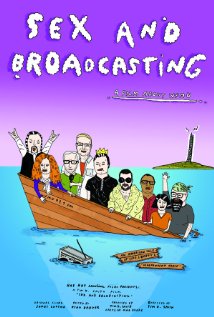At multiple points throughout Tim K. Smith’s Sex and Broadcasting we’re told its subject, the Jersey City radio station WFMU, should not exist. It’s not an NPR affiliate nor is it owned by an academic institution of a corporate entity. A home for the misfits, the freeform radio station functions as a kind of anarchist commune led by station manager Ken Freedman. A labor of love until it morphs into a full time job, WFMU plays virtually anything, ranging from a conservative Jewish conservative talk radio in the morning to experimental noise radio, indie rock and shock jocks throughout the rest of the day. The only rule, we’re told by admirer Adam “Ad-Rock” Horowitz, is you have to start in the mail room and work your way up, paying your dues as a volunteer for a year before you get your own show — not even a Beastie Boy can jump the line.
Sex and Broadcasting is mostly a good time. While shows on WFMU may overstay their welcome (a fact they’re proud of), the film does not. Mixing the usual talking heads in with a kind of hilarious on-the-wall approach, it recalls some of the funniest and most sincere moments of The Office. We follow Freedman and his board as they navigate a major budget crisis, FCC guidelines, the challenges of web streaming, managing the personalities, and the aging building they call home. Interestingly, Smith chooses to tell the history of WFMU in the film’s third act: a Jersey punk rock story of its own, the station under Smith’s leadership came of age on an abandoned college campus in East Orange.

The unpaid volunteer structure at WFMU grows unsustainable for certain stretches over time and in the present for Tom Scharpling’s three-hour weekly comedy broadcast, Best Show. In December he left WFMU and now produces and distributes the show as an independent podcast. Capturing his frustration, along with the voices of WFMU alumni, Smith has created an insightful portrait of the station and its longtime general manager Freedman, who forced a structure onto the organization following the collapse of its original FCC licensee, the defunct Upsala College.
Sex and Broadcasting succeeds despite some early moments that border on a celebrity fan love letter; amongst the celebrities is Matt Groening, who discovered the station on a whim. The personalities on the programing side are famed reapportion poet Kenneth Goldsmith: broadcasting in costume as alter-ego Kenny G, his antics include bringing a radio into the booth to broadcast another station live at WFMU, which we learn is an FCC violation.
Anything goes at WFMU, which is hilarious but also quite tragic when they find themselves in the red and have to pull together an emergency fundraiser to cover a $200,000 budget hole and shirking credit line, all while funding a booster antenna in advance of an FCC deadline. Chronicling the complexities and character flaws of the institution, Sex and Broadcasting is thankfully not entirely a promotional video nor a fan’s love letter, but a genuine character study, for the most part.
Sex and Broadcasting is screened at the Montclair Film Festival and opens on March 30th.

